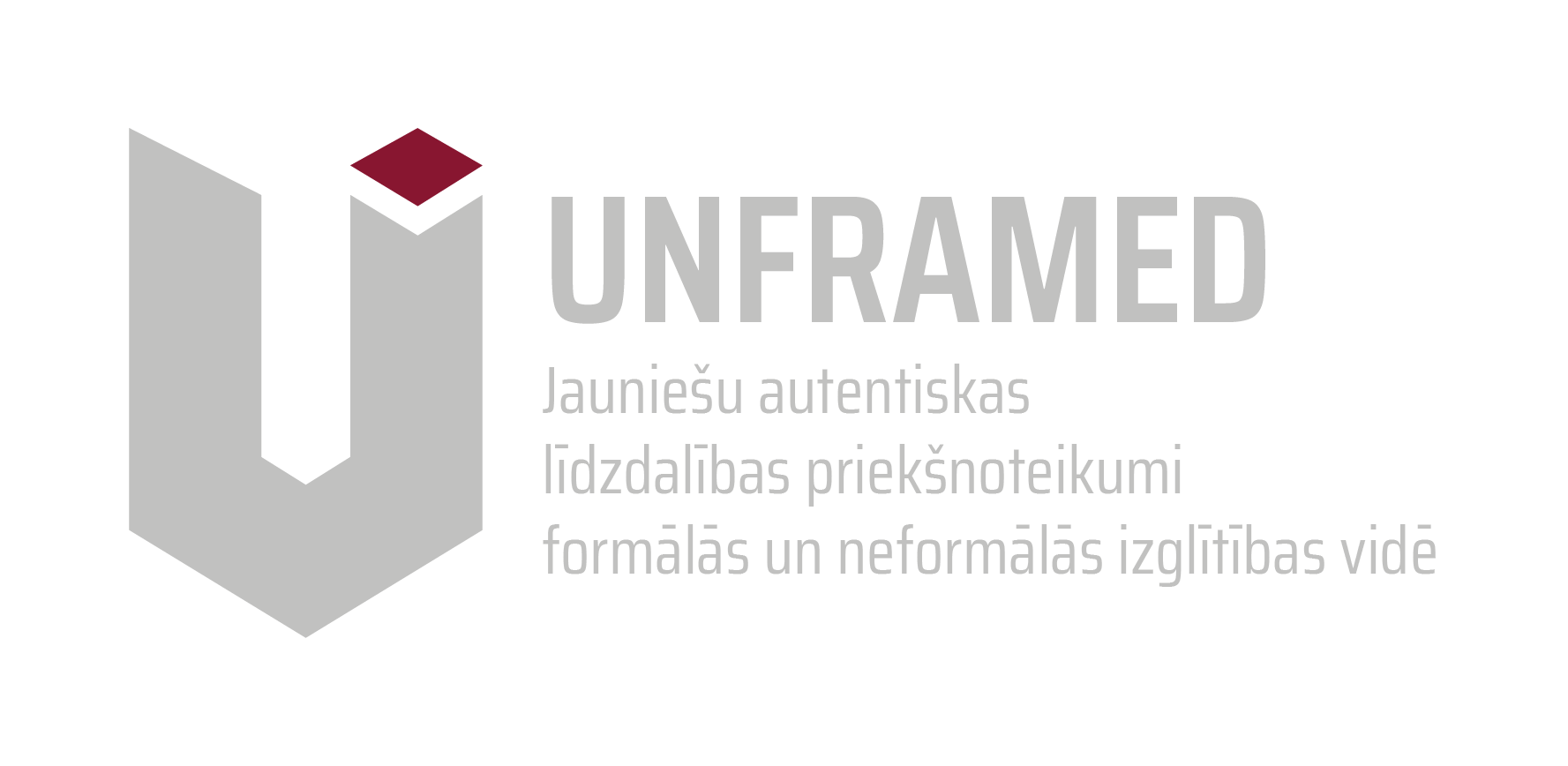Preconditions of authentic youth participation in formal and non-formal education / UNFRAMED
Project leader: Anda Laķe (dr.sc.soc.)
Project No: VPP-IZM-Izglītība-2023/6-0002
Project implementation: 22.12.2023.–21.12.2026.
Project funding: 349 995,00 EUR
Funded by: Ministry of Education and Science, Republic of Latvia
Project partners: Latvian Academy of Culture
Contacts:
Project leader: Dr.sc.soc Anda Laķe, anda.lake@lka.edu.lv; project coordinator and lead researcher Dr.art. Baiba Tjarve, baiba.tjarve@lka.edu.lv
The project ‘Preconditions of authentic youth participation in formal and non-formal education’ (UNFRAMED) (No VPP-IZM-Izglītība-2023/6-0002) is funded by the Ministry of Education and Science of the Republic of Latvia in the framework of the State Research Programme ‘Education’ (2023-2026). The State Research Programme is administered by the Latvian Council of Science.
Abstract
The objective of the project is to create new knowledge on the factors and expressions of young people’s (13-25 years old) participation, its authenticity in formal and non-formal education settings, as well as in extracurricular activities; develop strategies and practical solutions for the promotion of authentic and meaningful participation both on individual level and in the interaction of involved stakeholders; make an epistemological and practical contribution to the development of a youth-centred participatory approach.
A methodology in which the boundary between researchers, educators and young people is made permeable has been chosen: design-based implementation research, participatory action research, and participatory evaluation research. Visual methods, including digital storytelling and photovoice, will be used to explore young people's experiences. The research project will be implemented by the Latvian Academy of Culture and its interdisciplinary researchers’ team experienced in research on democratic and participatory processes, as well as on the youth sector. Testing and validating new forms of civic participation will contribute to an open and democratic learning environment. Apart from scientific publications, a range of applied results are planned aimed at recommendations for youth and education policy makers. The impact of the project is planned on the field of education sciences, as well as youth sociology, and their research community in Latvia un abroad.
Project team
Anda Laķe (Project Leader)
Baiba Tjarve (Lead Researcher)
Līga Vinogradova (Lead Researcher until 08.2025.)
Gints Klāsons (Participant until 01.2026.)
Liene Valdmane (Participant)
Sabīne Ozola (Participant-Student until 09.2025., Participant from 10.2025.)
Laura Brutāne(student participant)
Vendija Kokare (Participant-Student from 11.2025. to 06.2026.)
Una Žeimute (Participant-Student from 11.2025. to 06.2026.)
Anete Liepiņa (Participant-Student from 04.2025. to 08.2025.)
Valts Valters Kronbergs (Participant-Student from 04.2025. to 08.2025.)
Īrisa Brička (Participant-Student from 04.2025. to 06.2025.)
Andis Daugavvanags (Participant-Student from 04.2025. to 06.2025.)
Elizabete Granta (Participant-Student from 04.2025. to 06.2025.)
Laura Elīna Šulca (Participant-Student from 04.2025. to 06.2025.)
MAIN ACTIVITIES OF THE PROJECT
Execution of the project has been divided into five work packages (WP):
Work package 1: Continuity: the development of a theoretical framework and analytical model based on existing research. (Leader, contact person of WP: Anda Laķe, Līga Vinogradova)
Objectives: Analyse the conceptualisation of civic participation, youth participation, authentic participation in different research approaches, focusing on 1) the main determinants of civic participation, 2) research approaches to youth participation in formal and non-formal education settings. Critically assess the potential of applying international research approaches, analytical models and good practices from abroad in the study of youth civic participation in Latvia, in the development of authentic and meaningful forms of youth participation. Identify operational definitions and indicators of 'preconditions for youth civic participation', 'authentic and meaningful youth civic participation' in formal and non-formal education settings.
Work package 2: Exploring the current situation: dominant forms of youth participation in educational settings. (Leader, contact person of WP: Baiba Tjarve, Gints Klāsons)
Objectives: To examine the current situation: to identify the main factors influencing the active civic participation of young people in Latvia and the formation of links with the local community and the state; to assess the formal (general and vocational secondary education and higher education) and non-formal education environment as an institutional framework for civic participation (learning culture, governance and administration: the leadership structure, policies and decision-making processes that shape the institution; parental and/or community involvement, etc.); to identify the dominant forms of youth civic participation in formal and non-formal education environments.
Work package 3: Authentic and meaningful forms of youth civic participation in and outside educational settings: case studies of good practice. (Leader, contact person of WP: Līga Vinogradova, Gints Klāsons)
Objectives: To identify existing examples of good practice in Latvia and abroad, where authentic and meaningful civic participation activities, developed and practised independently by young people, can be identified in or outside formal and non-formal education settings. To identify existing barriers and prerequisites for their development, in order to develop solutions for the implementation of a youth-centred approach in youth policy and education settings.
Work package 4: Practical validation of the prerequisites for authentic and meaningful participation in a real educational environment. (Leader, contact person of WP: Līga Vinogradova, Liene Valdmane)
Objectives: Conduct design-based implementation research to test and validate authentic and meaningful youth civic participation practices and mechanisms that encourage participation in both formal and non-formal education institutions at the national and local level. Using a co-research approach, develop forms of youth participation that can be seamlessly integrated into formal education environments.
Work package 5: Project management, communication, synergies with stakeholders. (Leader, contact person of WP: Baiba Tjarve, Gints Klāsons)
Description of work: The WP concerns the correct and effective overall management and coordination of the UNFRAMED project. It aims to ensure efficiency and coherence of the project activities and to monitor the progress obtained, as well as to ensure optimal interaction between the applicant and social partners. The management includes administrative and financial tasks of the project. The coordination concerns organisation of the project activities, including organisation of project meetings, stimulating and facilitating dissemination of results and international collaboration.
DATA MANAGEMENT PLAN
Data management plan of the research project “UNFRAMED”
PROJECT ACTIVITIES
Project Insights Featured in a Radio Programme on Protest Culture and the Role of Youth | 01.12.2025.
On 1 December, Sabīne Ozola, a representative of the project “Preconditions of authentic youth participation in formal and non-formal education”, took part in a discussion on protest culture and the role of young people in it on the Latvian Radio 1 programme “Ģimenes studija” (“Family Studio”). The conversation was prompted by two recent events: protests against withdrawal from the Istanbul Convention, as well as the new Latvian Puppet Theatre performance “No! No! No!”, which explores puppets and their role in protests.
During the discussion, Sabīne shared insights into trends in youth participation in the 21st century and highlighted data from a youth survey (ages 13–25) conducted this year on the preconditions for civic participation and the dominant forms of civic engagement.
The recording of the programme is available (in Latvian): https://lr1.lsm.lv/lv/raksts/gimenes-studija/kas-vieno-lelles-un-protestus-saruna-par-protestu-kulturu-un-jau..
Meeting with Young People Held in Kuldīga | 13.11.2025.
On 13 November, Anda Laķe, the lead researcher of the project “Preconditions of authentic youth participation in formal and non-formal education”, met with students from grades 9–12 at the Kuldīga Youth House as part of the event “Participation – Decorative or Authentic.”
The event focused on the importance of authentic and meaningful participation, young people’s experiences, existing practices, and future opportunities. The discussion explored how young people can actively engage in community and civic life, influence decision-making processes, and drive change within their local communities. The event was organised by the Kuldīga District Children and Youth Centre.
International Scientific Conference on Youth Civic Participation Held with Researchers from Seven Countries | 05.11.2025.
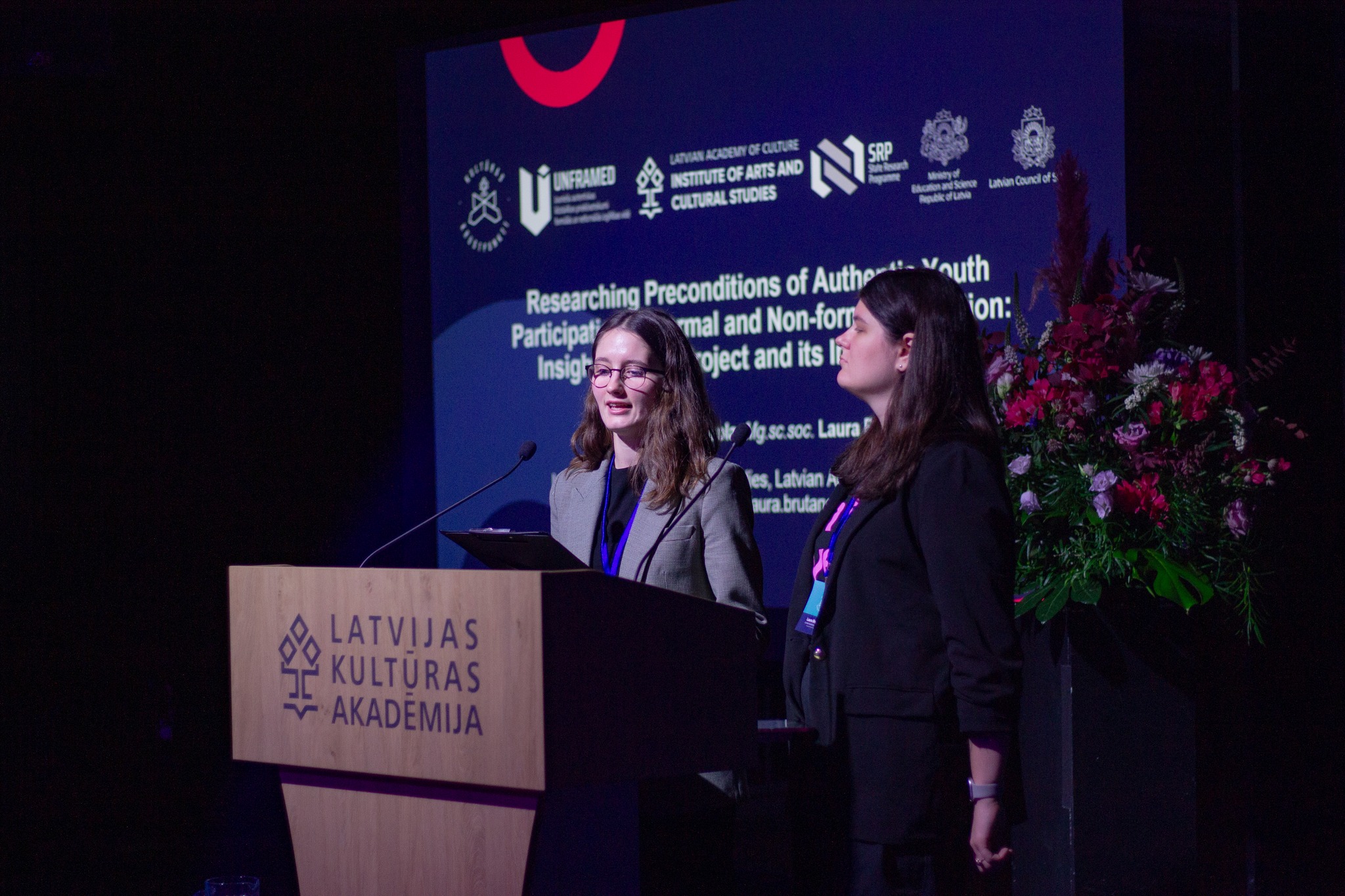
On 5 November, the international scientific conference “Youth Civic Participation: Decorative or Authentic? Formal or Meaningful?” was held.
The conference focused on an issue that has become particularly relevant in contemporary society: is young people’s involvement in public processes authentic and meaningful, or is it often merely symbolic and formal? By bringing together academic perspectives and practical experience, the conference provided a platform for researchers, policymakers, youth workers, and young people themselves. It fostered a deeper understanding of how to ensure authentic participation opportunities that engage young people not only as symbolic representatives, but as genuine agents of change.
Within the framework of the project “Preconditions of authentic youth participation in formal and non-formal education”, three papers were presented: “Researching Preconditions of Authentic Youth Participation in Formal and Non-Formal Education: Insight Into the Project “UNFRAMED” and its Initial Results” (Sabīne Ozola, Laura Brutāne), “Current Practices of Participatory Projects in Schools and Communities: Challenges and Future Opportunities” (Liene Valdmane), and “Exploring Youth
Participation in Contemporary Art Practices: A Case Study of a Processual Participation Residency” (Lote Katrīna Cērpa, Valts Valters Kronbergs, Anete Liepiņa, Diāna Mierture, Sabīne Ozola).
Conference recording: https://www.youtube.com/live/_11syqpb8aI?si=pwesdAh8dRrlgarz
Book of abstracts: https://drive.google.com/file/d/11XtUFpQTTZk9ep8kKel0jNv2dDxC-v9e/view
Conference programme: https://drive.google.com/file/d/1XXz2Pi1f7Sfv5K_ytVH7aCXfhGMlIz5k/view
Project Results Presented at the Conference “The Next Step in Youth Work – Volunteering” | 14.10.2025.
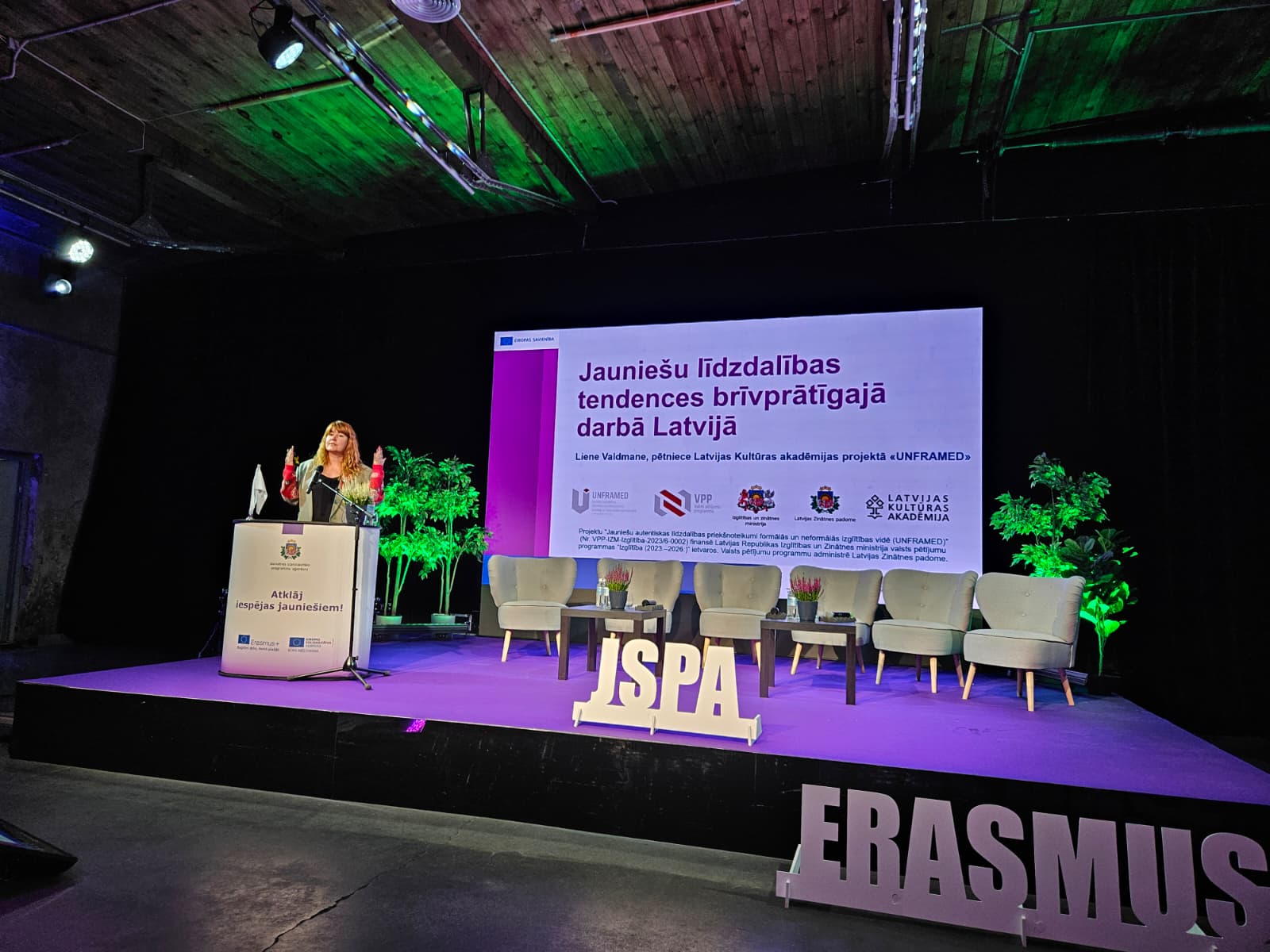
On 14 October, Liene Valdmane, representative of the project “Preconditions of authentic youth participation in formal and non-formal education”, took part in the conference “The Next Step in Youth Work – Volunteering”, organized by the Agency for International Programs for Youth.
In her presentation, Liene introduced participants to the results of youth participation research conducted in Latvia to date and highlighted the key prerequisites for authentic and meaningful youth engagement.
A recording of the conference livestream is available here: https://www.youtube.com/watch?v=NiXefXKvEO0&t=3s
Applications Open for the Latvian Culture Canon Contest for Secondary School Students on Creating an Authentic Canon | 29.09.2025.
For the 14th year, the Latvian Academy of Culture announces the Latvian Culture Canon Contest for students in grades 10–12 under the theme “The Latvian Culture Canon in the Experience of Youth: Authentic or Decorative?”.
The contest invites participants to highlight less visible yet personally meaningful cultural practices and values.
Aiming to foster discussion about contemporary youth cultural values and the ways in which these may be canonized, as well as to encourage young people to consciously reflect on their personally significant cultural experiences, this year’s contest challenges students to create their own original cultural canon.
The 2025 contest is organized in collaboration with the project “Preconditions of authentic youth participation in formal and non-formal education”, promoting authentic youth participation in the process of cultural canon formation.
Further information about the contest is available here (in Latvian): https://lka.edu.lv/lv/aktuali/jaunumi/kulturas-kanons-jauniesu-pieredze-latvijas-kulturas-akademija-izsludina-konkursu-skoleniem/
Results of the First 18 Months of the National Research Programme “Education” Published | 29.09.2025.
Independent international experts have given a positive assessment and recommended the continuation of the project “Preconditions of authentic youth participation in formal and non-formal education”, implemented by the Latvian Academy of Culture. The project provides a valuable foundation for the improvement of youth policy and contributes to the development of a democratic and inclusive educational environment.
During the first 18 months, activities have been carried out across several research directions, including:
- conducting an analysis of theoretical sources to examine how civic participation, youth participation, and authentic participation are conceptualized within different research traditions (sociology, political science, youth studies);
- developing indicators for measuring authentic youth participation and conducting two national-level surveys that revealed the values, interests, and barriers influencing young people’s civic engagement;
- mapping and evaluating existing financial instruments supporting youth civic participation by analysing data from previous surveys, regulatory frameworks of funding programmes in Latvia and abroad, and conducting interviews with stakeholders in the field of youth work.
A detailed evaluation report is available here (in Latvian): https://www.lzp.gov.lv/lv/media/12107/download?attachment
Press release (in Latvian): https://www.lzp.gov.lv/lv/jaunums/vpp-izglitiba-2023-2026-vidusposma-izvertejums-pieradijumos-balstiti-risinajumi-izglitibai-no-skolenu-prasmju-diagnostikas-lidz-atbalstam-akademiskajai-karjerai?...
Latest Survey Findings on Youth Participation Presented at the 13th ESA Sociology of the Arts Midterm Conference | 08.-09.09.2025.
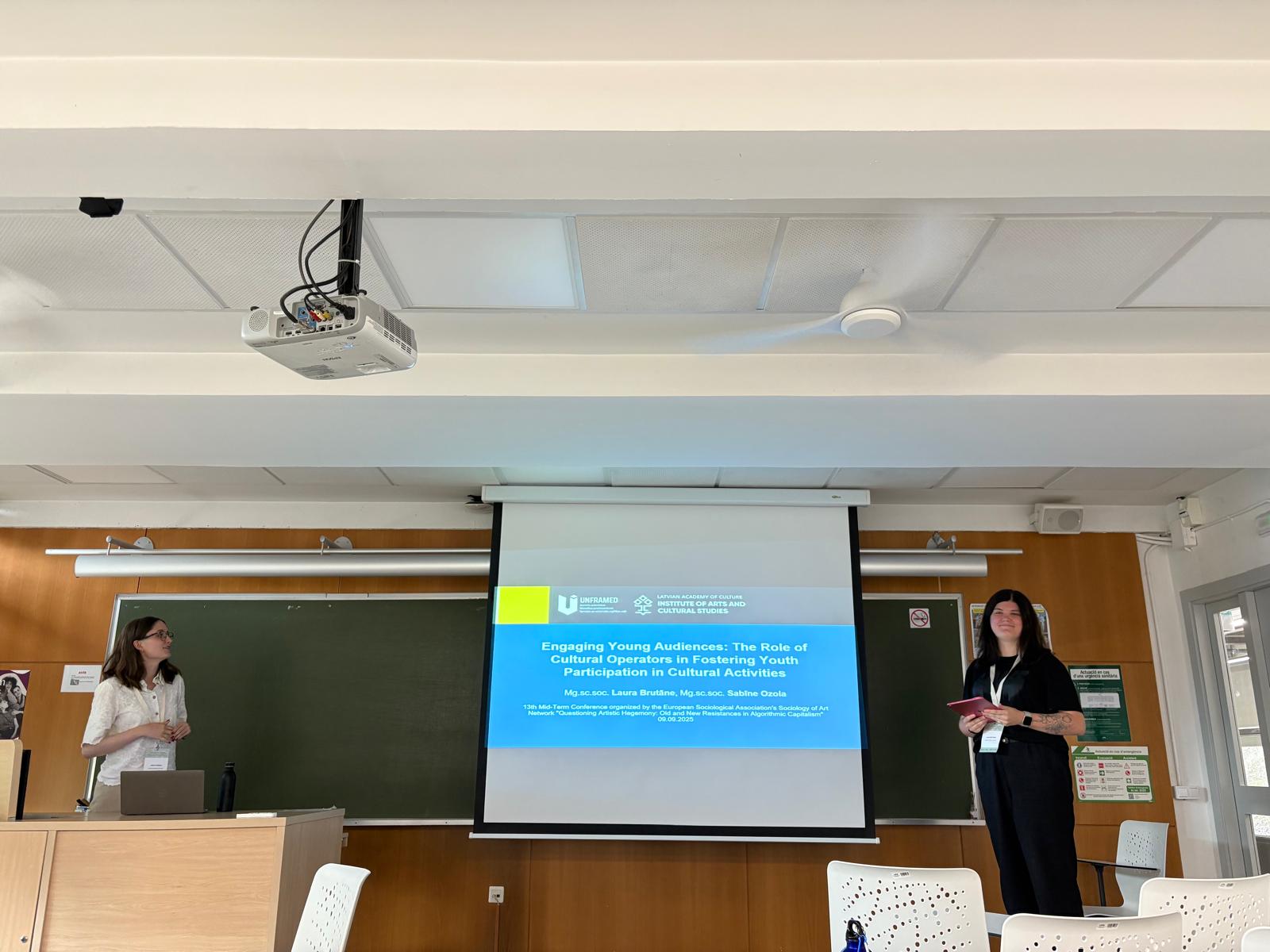
On 8-9 September 2025, the 13th Midterm Conference of the European Sociological Association’s (ESA) Sociology of the Arts Research Network, “Questioning Artistic Hegemony: Old and New Resistances in Algorithmic Capitalism,” was held in Barcelona, Spain. On the opening day, research assistants Sabīne Ozola and Laura Brutāne delivered a paper entitled “Engaging Young Audiences: The Role of Cultural Operators in Fostering Youth Participation in Cultural Activities”. The following day, researcher Līga Vinogradova and research assistant Sabīne Ozola presented their paper “Rethinking Participation: New Ways Youth Engage with Culture”.
The full conference programme is available here: https://webs.uab.cat/esarts2025/
Call for Papers: International Conference “Youth Civic Participation: Decorative or Authentic? Formal or Meaningful?” | 28.08.2025.
On 5 November 2025, the Latvian Academy of Culture will host the international scientific conference “Youth Civic Participation: Decorative or Authentic? Formal or Meaningful?”. The aim of the conference is to foster academic and practical dialogue on the experiences and opportunities of youth civic participation in the context of democratic challenges, technological innovation, and geopolitical crises, with particular attention to new, unconventional, and alternative forms of participation.
Further information on the application process is available here: https://lka.edu.lv/en/featured/news/latvian-academy-of-culture-invites-paper-proposals-for-the-international-conference-youth-civic-participation-decorative-or-authentic-formal-or-meaningful/
Second Seminar on Existing Financial Instruments and Programmes Supporting Youth Civic Participation Activities | 12.08.2025.
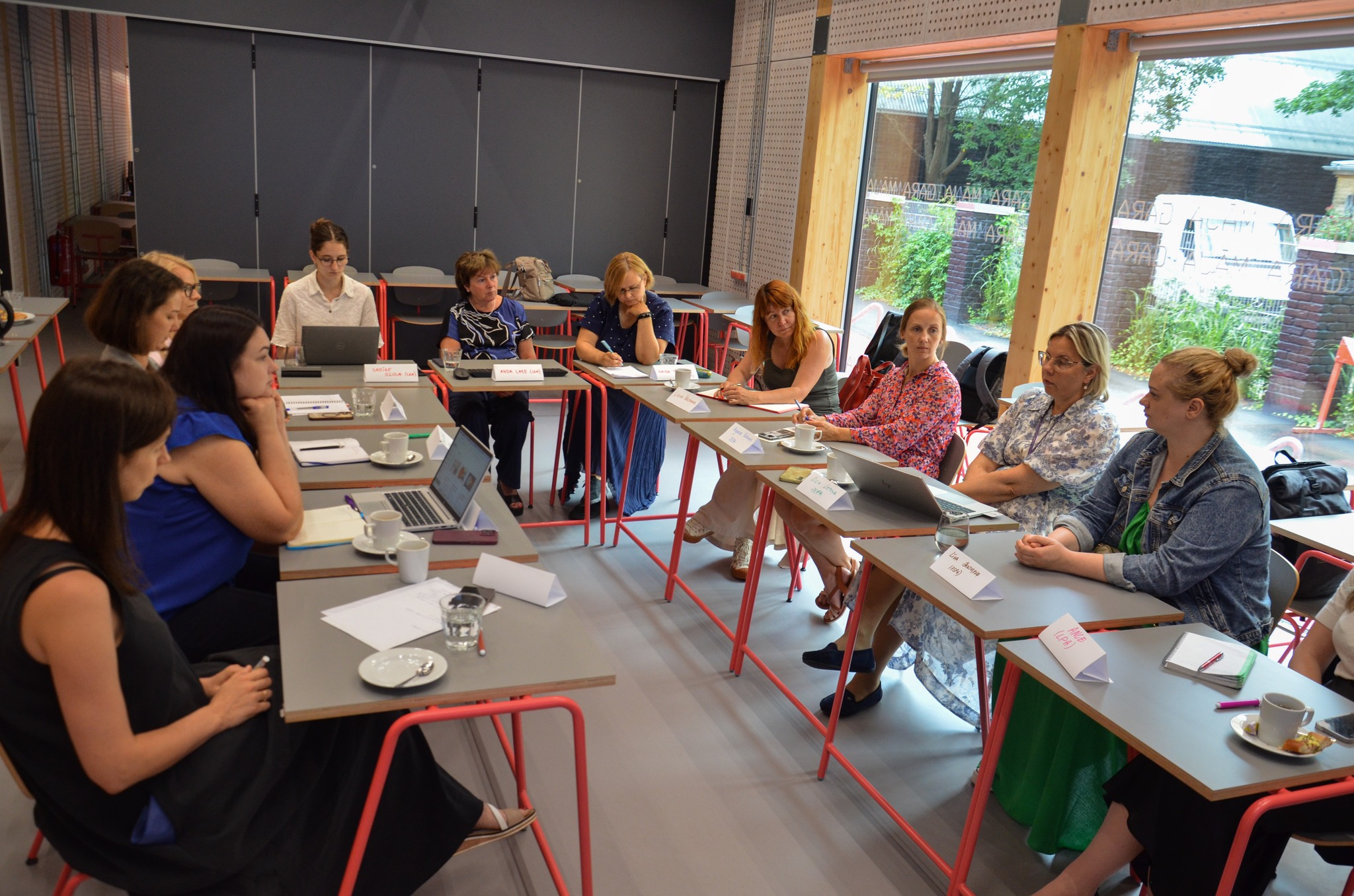
On 12 August, the second discussion was held with representatives of state institutions and non-governmental organizations on existing financial instruments and programmes that support youth civic participation activities.
The seminar opened with a presentation by research project “UNFRAMED” leader Anda Laķe, who introduced participants to the conceptualization of authentic and meaningful participation, as well as the activities carried out within the project to date. This was followed by Baiba Tjarve, project representative, who presented data on the challenges encountered in the implementation and administration of youth participation projects. The session continued with an exchange of ideas on possible improvements.
Building on the data collected and the outcomes of the discussions, the project team will now prepare recommendations for financial programmes and municipalities that support youth civic participation initiatives.
Participants included Līga Lejiņa, Līva Jakovļeva, and Agnese Kalniņa (Agency for International Programs for Youth), Randa Ķeņģe (Ministry of Education and Science), Marita Kroča (State Education Development Agency), Solvita Vigule (Jūrmala Youth Initiative Centre), Inese Puriņa and Ance Mālkalna (Latvian Civic Alliance), as well as Liene Valdmane (research project “UNFRAMED” and European Movement in Latvia).
Launch of the Evaluation of the Youth Participation Project | 18.07.2025.
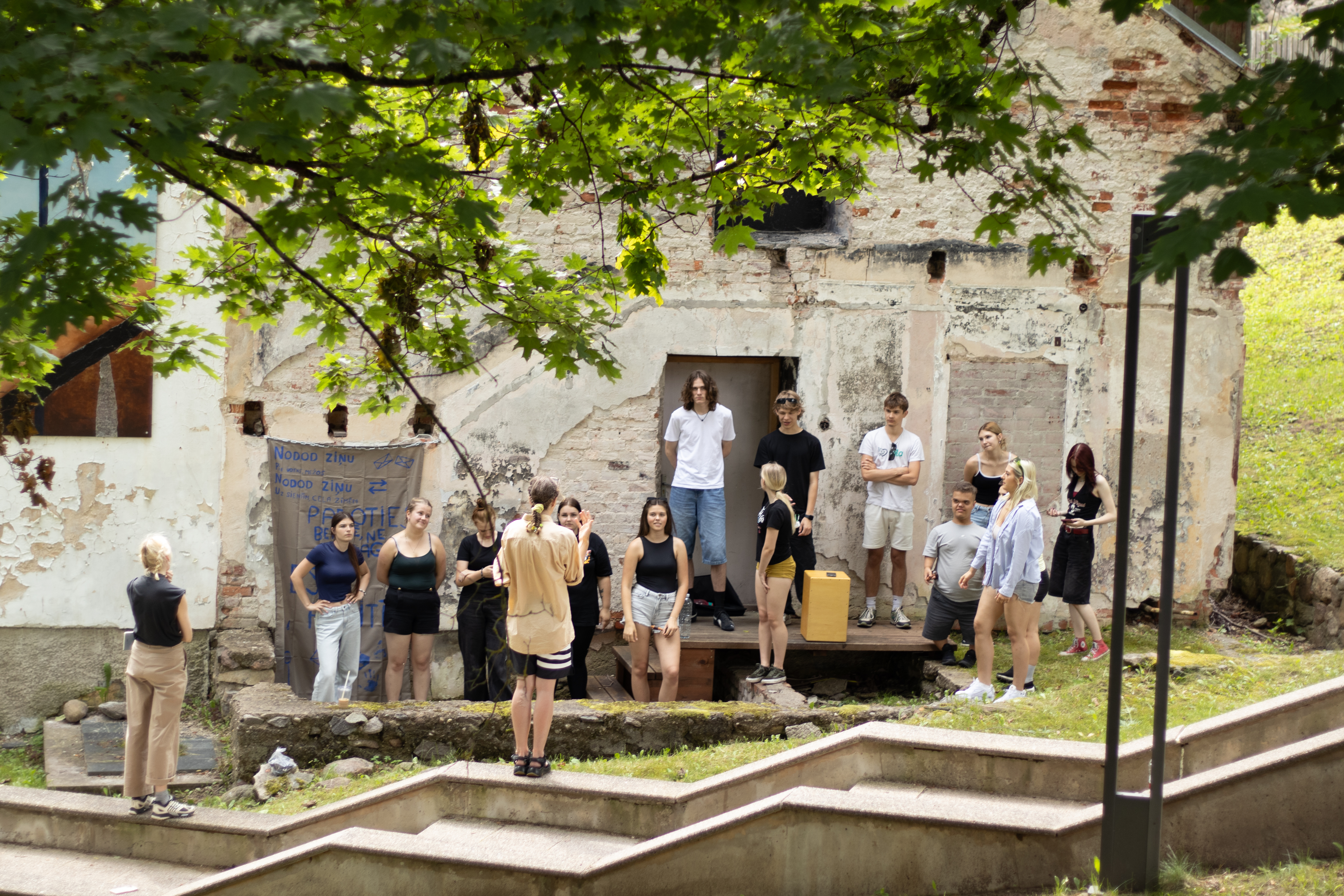
Work has commenced on the research project “Youth Participation in Contemporary Art Practices: A Case Study of the Project ‘GraffitO!’”. In this study, research assistants Sabīne Ozola and Lote Katrīna Cērpa, together with students Anete Liepiņa, Valts Valters Kronbergs, and Diāna Mierture, will examine the contemporary art practices employed in the project “GraffitO! – Contexts of Youth Wellbeing in Street Art” and assess young people’s participation, including its benefits and challenges.
The evaluation will contribute to current scholarly discussions on youth participation and the effectiveness of new, meaningful forms of engagement, with particular attention to the role of contemporary art practices in fostering participation.
As part of the project, a creative camp was held in Valmiera from 14 to 18 July. Led by artists, the camp introduced young participants to research-based art methods and encouraged exploration of graffiti and urban environment issues. Researchers observed the process, following how young people engaged in the creation of a participatory event.
The camp culminated in a process-based public event in Valmiera on 30 July, organized in collaboration with the Institute of Theatre for Children and Young People and the Valmiera Summer Theatre Festival.
Students Participate in the Summer School “International Research in Cultural and Arts Education” in Germany| 7–11 July 2025
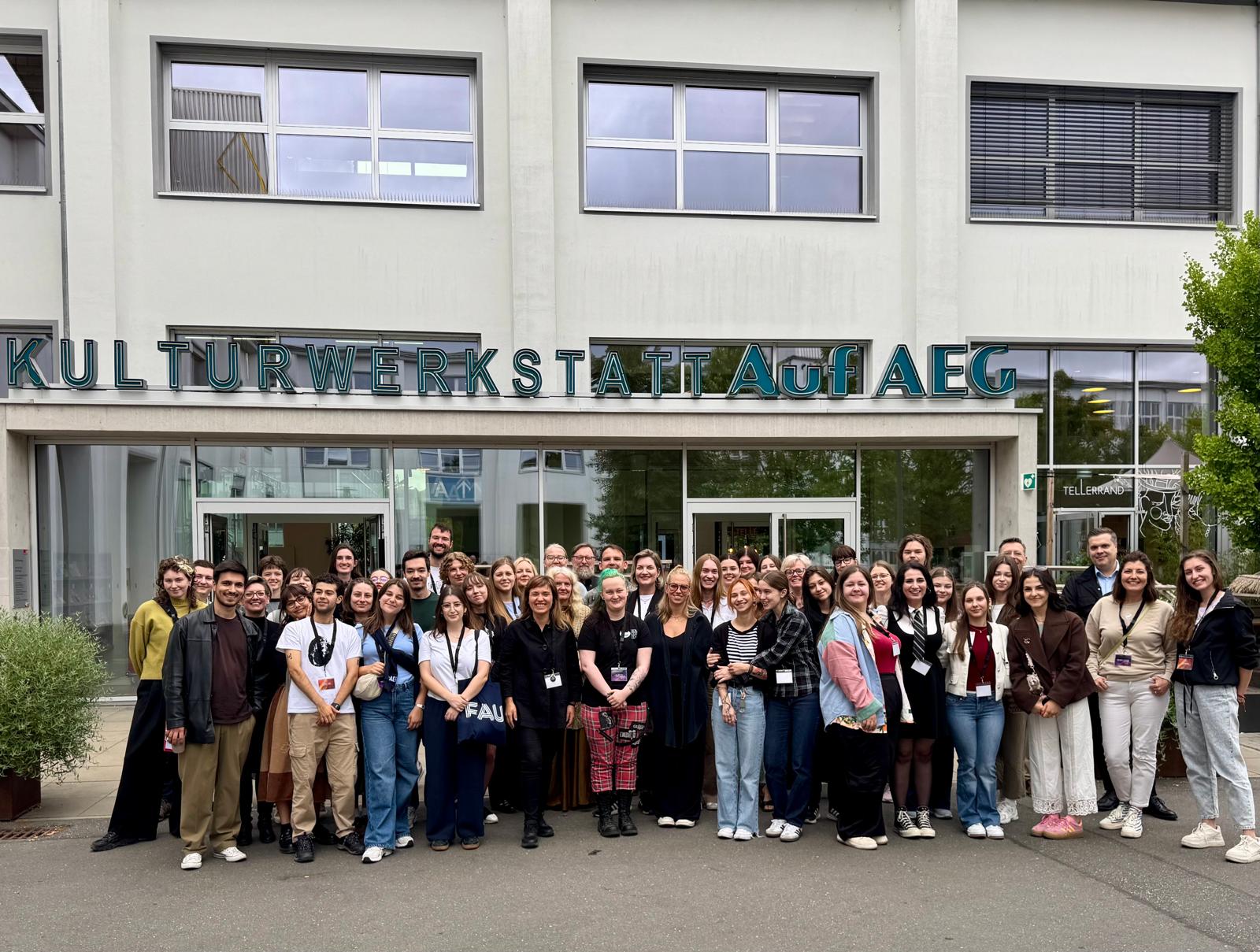
From 7 to 11 July, the summer school “International Research in Cultural and Arts Education” took place in Nuremberg, Germany, bringing together students and lecturers from eight European countries: Austria, Bosnia and Herzegovina, Bulgaria, Germany, Poland, Portugal, the Netherlands, and Latvia.
The Latvian Academy of Culture was represented by master’s students of the programme “Cultural Heritage Governance and Communication” – Aigars Noviks, Gunta Kivliša, Ieva Plētiena, Ilze Rusova, and Liene Ošiņa. They were joined by bachelor’s students of the programme “Cultural Sociology and Management” – Diāna Mierture, Anete Liepiņa, and Valts Valters Kronbergs, as well as doctoral student Laura Brutāne. The Academy’s Institute of Culture and Arts was represented by research assistant Lote Katrīna Cērpa.
The summer school programme featured lectures and workshops dedicated to interdisciplinary, postcolonial, digital, and sustainability research, as well as cultural studies, with a particular focus on their relevance to cultural and arts education processes.
Discussion “Authentic Participation – What Is It and How to Recognize It?” at the LAMPA Conversation Festival 2025 | 21.06.2025.
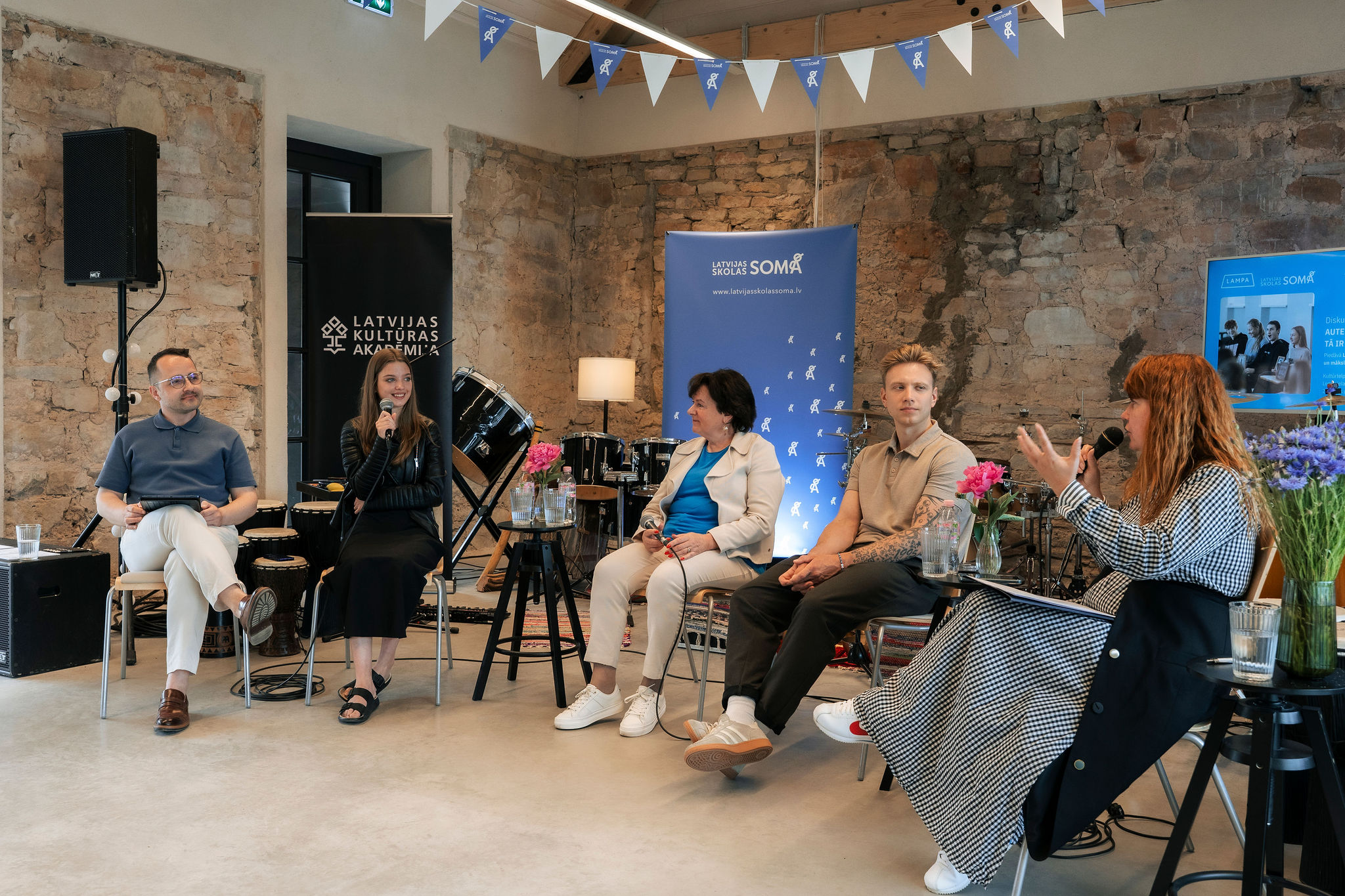
On 21 June, in cooperation with the Latvian National Centre for Culture’s arts and culture education programme “Latvian School Bag”, the discussion “Authentic Participation – What Is It and How to Recognize It?” was held at the LAMPA Conversation Festival.
The event explored the shifts required in public attitudes and practices to ensure that youth participation reflects young people’s own defined interests, guarantees their voice in decision-making, and is supported by power-sharing, transparency, accountability, and institutional backing.
The panel brought together Anda Laķe, Professor at the Latvian Academy of Culture, leading researcher and head of the research project “UNFRAMED”; Lauris Zalāns, RADIO TEV host; Edgars Bērziņš, history teacher and board member of the European Movement in Latvia; and Madara Senkāne, student at Valmiera State Gymnasium and member of the 10th, 11th, and 12th Youth Parliament. The discussion was moderated by Liene Valdmane, researcher of the research project “UNFRAMED” and Secretary General of the European Movement in Latvia.
Recording of the discussion (in Latvian): https://www.youtube.com/watch?v=CggL8lUgioI&t=1s
Photo gallery: https://www.flickr.com/photos/latvijasskolassoma/albums/72177720327041978/
Seminar on Funding Programmes Supporting Youth Civic Engagement Activities | 18.06.2025.
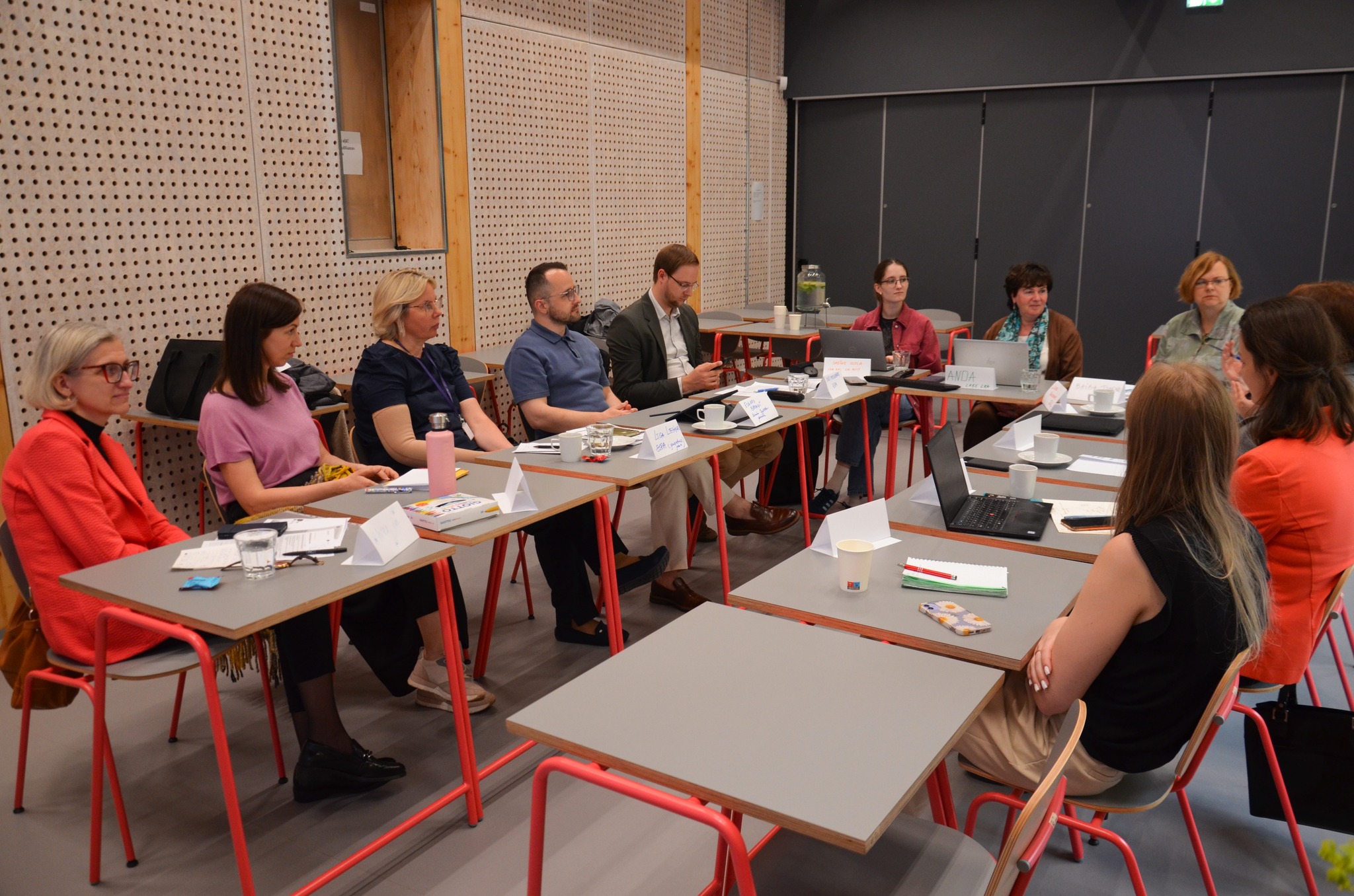
On 18 June, representatives of governmental and non-governmental organizations were invited to take part in a discussion on funding programmes that support youth civic engagement initiatives, as well as on effective ways to involve young people themselves in the preparation and implementation of such projects.
The discussion brought together Līga Lejiņa and Nils Mosejonoks from the Agency for International Programs for Youth, Randa Ķeņģe from the Ministry of Education and Science, Antra Meņģele from the State Education Development Agency, Inga Liepa from the Society Integration Foundation, Inese Puriņa and Ance Mālkalna from The Civic Alliance – Latvia, and Edgars Bērziņš from the Jūrmala Education Department. Liene Valdmane represented both the European Movement in Latvia and the research project “UNFRAMED”.
The discussion was moderated by Prof. Anda Laķe, Director of the Institute of Culture and Art at the Latvian Academy of Culture and Project Leader of the “UNFRAMED” research project, together with Baiba Tjarve, Senior Researcher, and Sabīne Ozola, Research Assistant.
Research on Youth Participation in Schools and Universities Underway | 22.05.2025.
In May 2025, two nationwide surveys were conducted in Latvia to examine opportunities for young people to develop authentic and meaningful participation practices both within and beyond educational institutions. The first survey targets school and university students aged 13 to 25, focusing on civic participation in education settings. The second, an online survey, explores young people’s views on involvement in student councils and municipal youth councils.
Further information (in Latvian): https://www.lka.edu.lv/lv/aktuali/jaunumi/petnieki-skaidro-jauniesu-autentiskas-lidzdalibas-iespejas
Researchers Participate in Conference at Cambridge | 24.-26.04.2025.
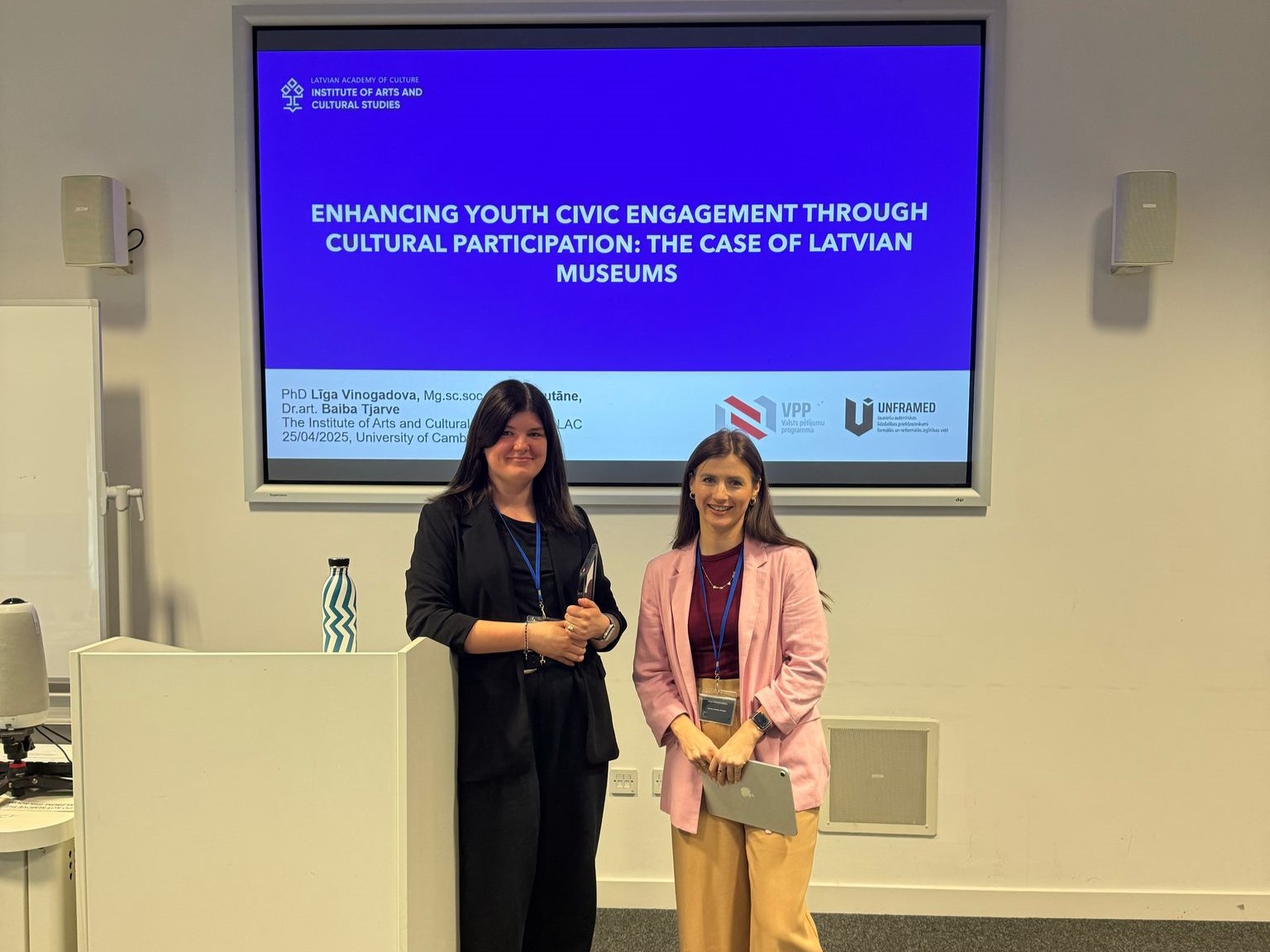
From 24 to 26 April 2025, Līga Vinogradova, Executive Lead of the research project “UNFRAMED”, and student, research assistant Laura Brutāne took part in the 16th Conference on Baltic Studies in Europe (CBSE), organized by the Cambridge University Centre for Geopolitics Baltic Programme in Cambridge, United Kingdom. They presented a paper entitled “Enhancing Youth Civic Engagement through Cultural Participation: The Case of Latvian Museums”.
International webinar on youth civic participation with British researcher Dan Moxon | 07.02.2025.
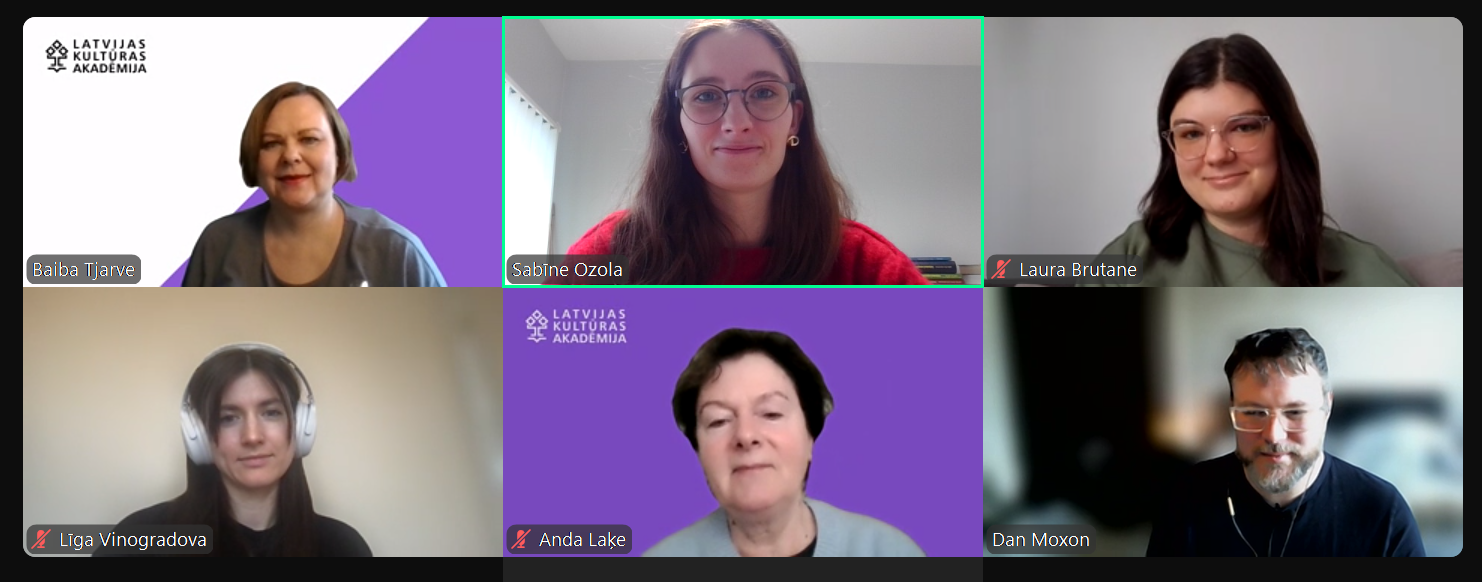
On 7 February, in an international webinar, British youth participation researcher Dan Moxon presented to the project team his work on promoting meaningful and inclusive youth participation, with a particular focus on creating dialogue to ensure that young people's voices are heard and influence the decision-making process. Dan pointed to the increasing emergence of new forms of participation (including digital) and described the preconditions for meaningful and authentic participation that he has defined in his research and practice over the last twenty years.
The webinar outlined the different forms of participation that are being researched and analysed in the scientific community, and pointed to the different reasons for the low rates of formal participation among young people. Dan stressed that meaningful and authentic participation is based on building long-term collaborations, where youth workers and organisations also play an important role, as they can be key intermediaries in the dialogue between researchers and young people.
Dan's experience in addressing the lack of participation, for example in the education sector, provided a multidimensional insight into youth research and highlighted the potential challenges and risks in exploring the participatory component. Issues around the role, behaviour and approach of the researcher in working with young people were also raised in discussion, where Dan outlined a number of practical solutions that could be used in future project development and fieldwork.
Dan Moxon is a researcher and practitioner specialising in inclusive youth participation with over 20 years' experience working with children and young people. His work focuses on how children and young people's participation can influence policy and the development of participatory structures and processes. Originally a youth worker at local and regional level in England, he now works across Europe and beyond, supporting a range of organisations to develop their approaches to youth participation.
Participation in the Plenary Session of the Conference Series Crossroads of Cultures XVIII | 06.11.2024.
On 6 November 2024, Anda Laķe, head of the research project “UNFRAMED”, took part in the plenary session “Crossing Boundaries in Science and Art” at the international conference “Crossroads of Cultures XVIII”. She delivered a presentation entitled “Generational Scale and Boundaries: Monologue, Dialogue, and Discussion in Society, Culture, and Science.”
Recording of the plenary session (in Latvian): https://www.youtube.com/watch?v=pFQc6j5yjTA&t=11743s
Presentation of the results of the first phase of the study at the Conference of the European Sociological Association in Portugal | 27.08. - 30.08.2024.
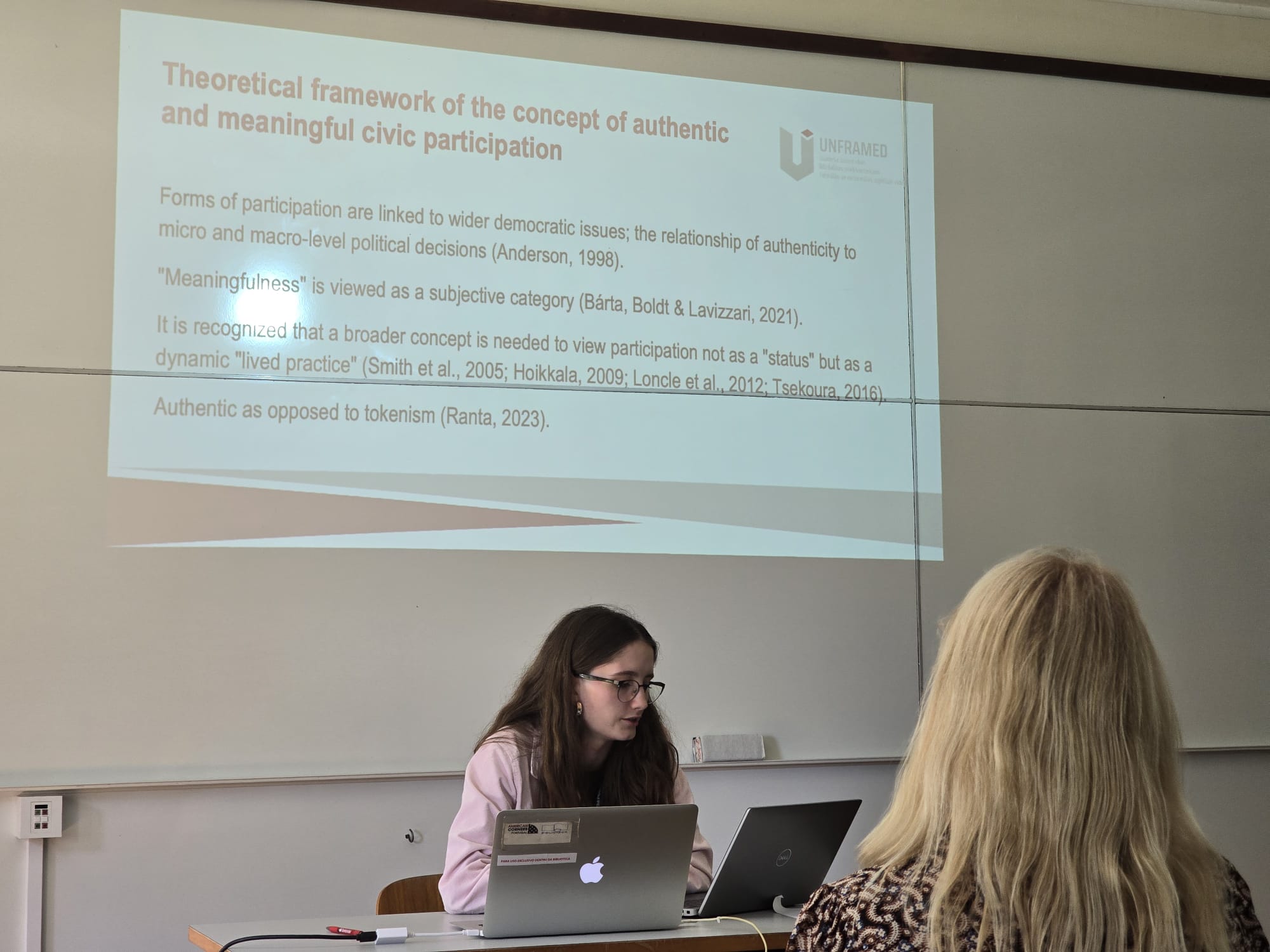
At the European Sociological Association (ESA) conference "Tension, Trust and Transformation", which took place in Porto, Portugal, the researchers of the "UNFRAMED" shared the first results and findings of the project, in the paper "Cultural Practices in Formal Education as an Arena for Youth Authentic and Meaningful Civic Participation" (authors: Anda Laķe, Līga Vinogradova, Sabīne Ozola).
Fieldwork at the Democracy Festival in Kuldīga and the Youth Festival "Kopums" in Livani | 3.08.2024. and 12.08.2024.
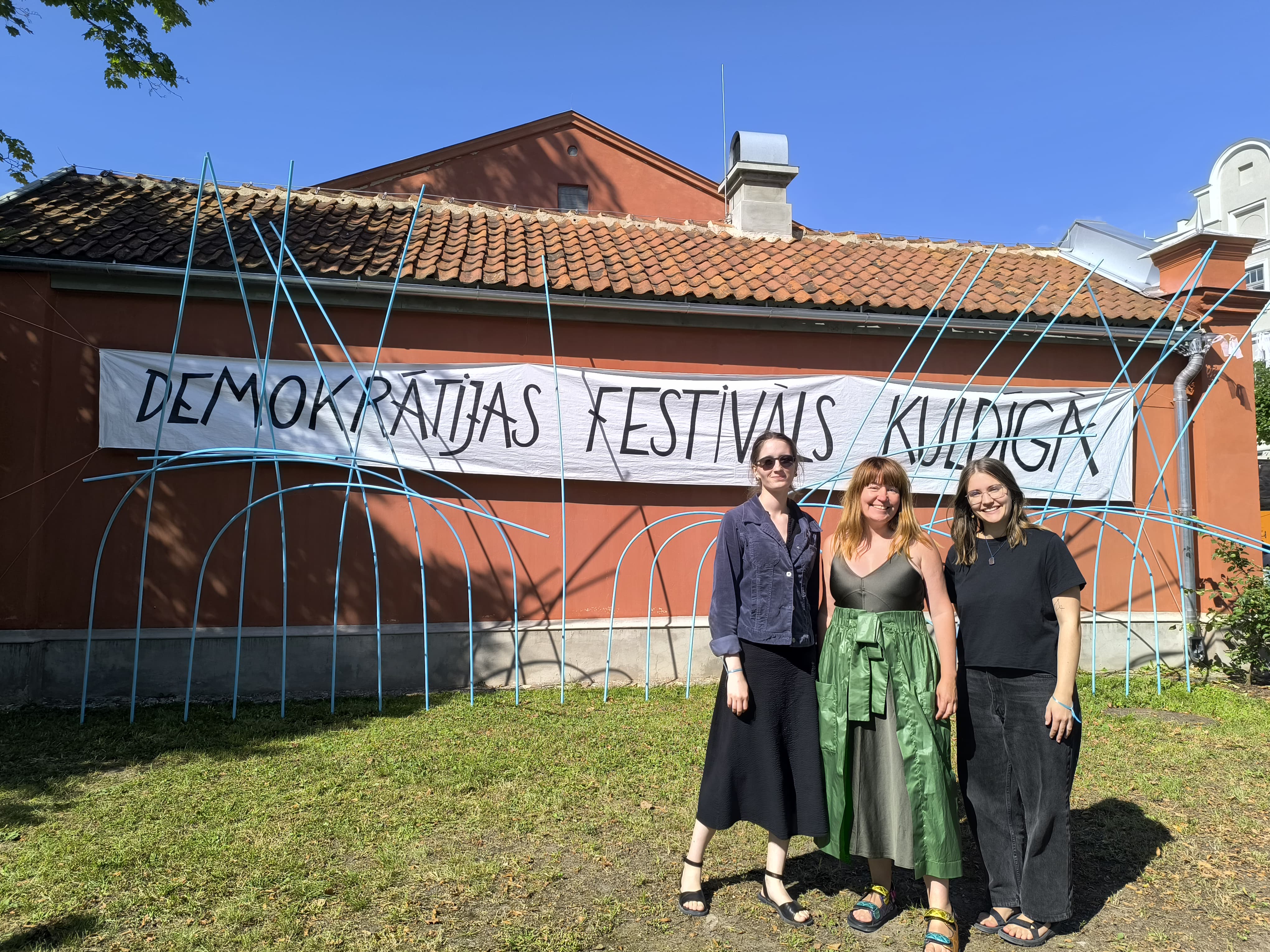
On 3 August the Democracy Festival in Kuldīga and on 12 August the Youth Opportunities Festival "Kopums" in Livani hosted the fieldwork of the research project "UNFRAMED" implemented by the Institute of Arts and Cultural Studies of the Latvian Academy of Culture, which was attended by project participants Liene Valdmane and Sabīne Ozola, as well as Latvian Academy of Culture graduate Anne Katrīna Norenberga.
Representatives of NGOs and other stakeholders in Kuldīga and young people from all over Latvia in Livani shared their experiences of how they have managed to get involved and participate themselves or motivate others to get involved in order to change and improve the environment around them. The stories will be collected and used in the future research process.
Researchers Participate in the Annual Meeting of the European Network of Observatories in the Field of Arts and Cultural Education (ENO) | 15.-16.05.2024.
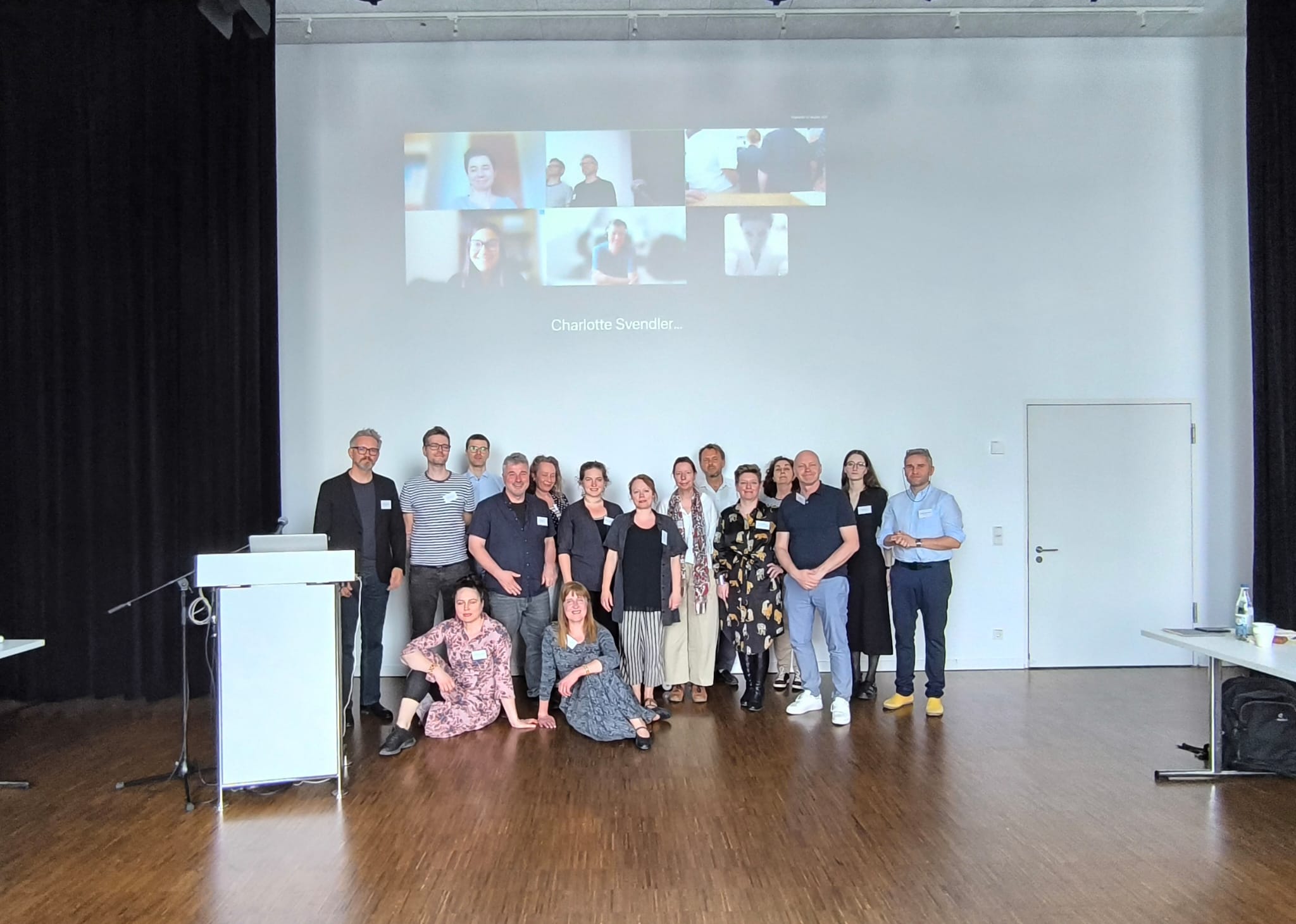
On 15-16 May 2024, the annual meeting of the European Network of Observatories in the Field of Arts and Cultural Education (ENO) took place in Nuremberg, Germany. The Latvian Academy of Culture was represented in person by research assistant Sabīne Ozola, while leading researcher Baiba Tjarve contributed remotely as a member of the ENO board. Among the Latvian representatives present on site was also Baiba Moļņika, Secretary General of the Latvian National Commission for UNESCO.
Over the course of two days, participants discussed UNESCO’s guidelines for arts and cultural education, with particular attention to the concept of cultural awareness and expression – its theoretical and practical interpretations, as well as ways of adapting it at the national level. The meeting also provided an opportunity to exchange best practices on how cultural education is implemented in both formal and non-formal learning environments across different European countries.
In addition, the network’s future plans and opportunities were explored, including potential avenues for further collaboration with researchers from other countries within the framework of the research project “UNFRAMED”.
